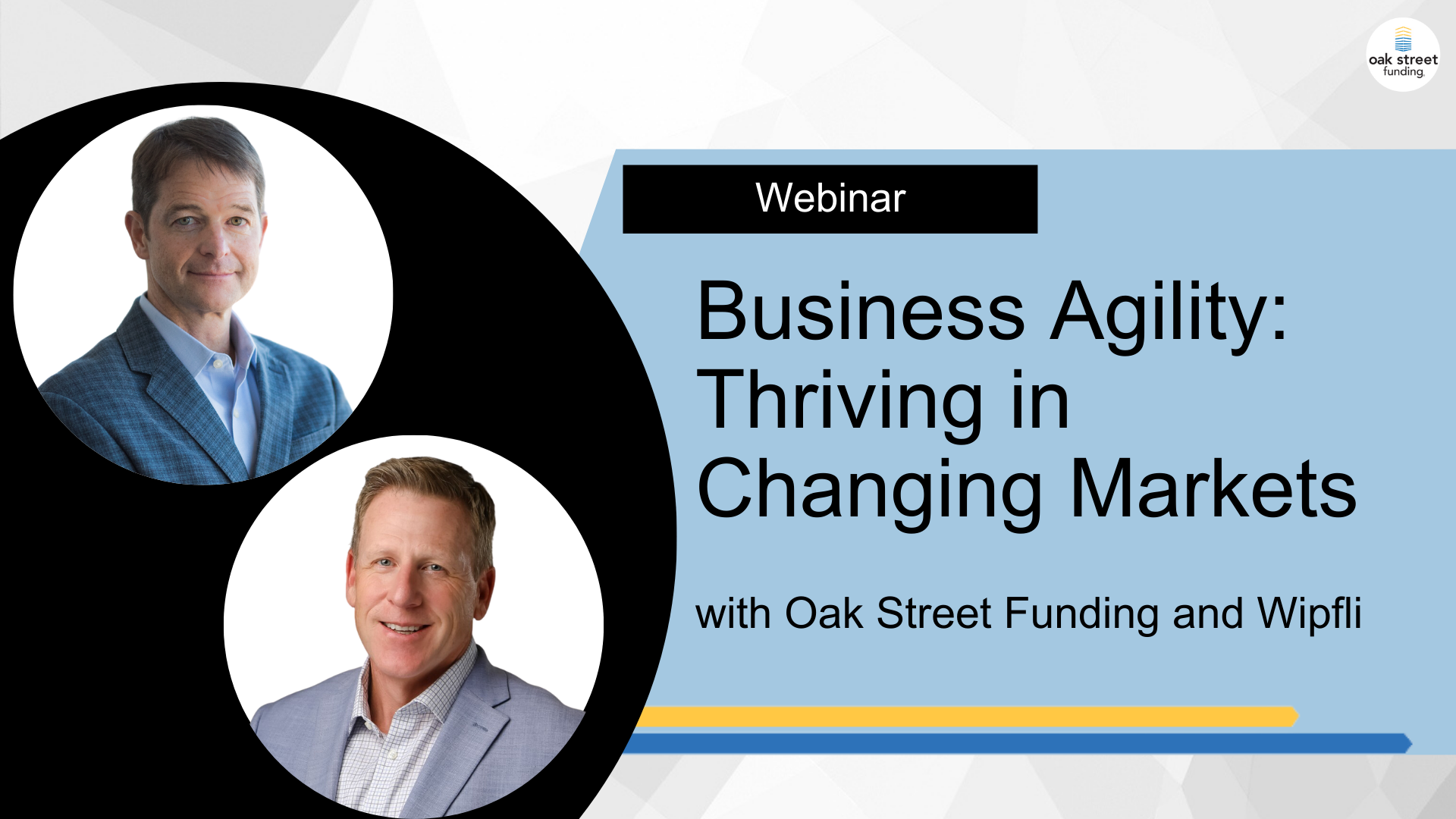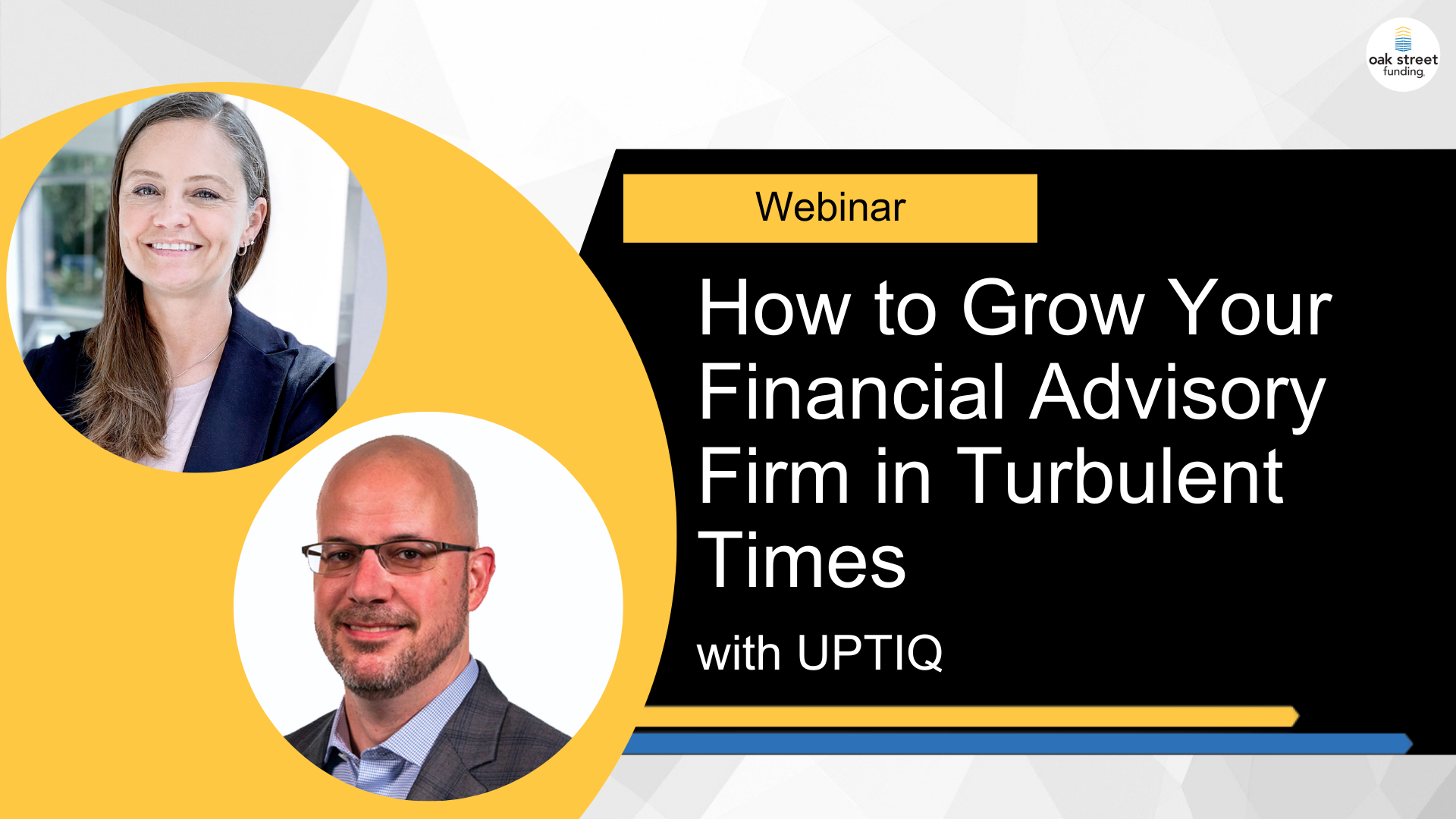Mid-Year Review: Market Update and Underwriting Outlook
- 0.5
- 1
- 1.25
- 1.5
- 1.75
- 2
Bridget Haight: Hi everybody, and thank you for joining us today. I'm Bridget Haight, host and moderator for Oak Street Funding Webinars and Podcasts. Today I'm excited to bring you a mid- year review through discussion of the market and its impact on the RIA, CPA, and insurance industries, as well as an underwriting update to understand the impact there. I'm excited to have with me Rick Dennen, founder and CEO of Oak Street Funding, and Rob Roach, director of underwriting. We received quite a few questions from registrants, so we'll start to answer those as many as we can, and combine a few to just offer you some great insights. So Rick, Rob, thank you so much for joining us today. I'll just start right in. To start, can you comment on the banking turmoil of the first half of the year, and provide insight into the future of the industry? Rick, I'll start with you.
Rick Dennen: Yeah, so I think the turmoil that occurred was really because of the rapid acceleration in interest rates, and that really caused somewhat of a liquidity issue and changes to the various banks' investment portfolios. And it really drilled down on how the value of those portfolios changed. And because the rates increased so much, the values of their bond portfolios decreased significantly. I read a report last week that showed that the 500 basis point increase over a five quarter period was the fastest acceleration to kind of curb inflation than any point in time in history. The second fastest was only 425 basis points, and it was like over nine quarters. And then you go back down to threes and twos. So a 5% increase, if somebody's got a long- term bond portfolio, works in inversely relative to value. And that negativity that would come through, either as other comprehensive income or right through your P& L, is what's causing the change and the focus on liquidity. So kind of started there with the recession. And with inflation, it is kind of cutting into a credit crisis as well, which seems to be slowing down banks and things like that. But the recession continues to chug along. I know there were some more stats coming out today. And I haven't seen those yet today, but continue to see relatively decent stats that we're not going into a recession just yet. It keeps getting pushed out and pushed out. And rates, the last rate cycle was kind of put on hold. So those things are happening. Hopefully we'll see that slowdown inflation and right now they're saying in 2024 rates could start coming down again.
Bridget Haight: Great, okay.
Rick Dennen: So the impact on a bank is, they're talking that the larger banks could have more regulatory capital requirements and things like that. All that'll still come up. I guarantee there'll be something from a regulatory perspective that it will come out of these issues.
Bridget Haight: Okay. Rob, how about you? What do you think?
Rob Roach: Rick stole my thunder with his last point. So I think the possibility, some extra regulation coming out of this. Whether it deals with concentration risk or from whatever aspect that might ultimately look like, those things might happen. But again, it's hopefully the increase, the unprecedented increase in interest rates, I think, drove a lot of the issues. And so really hopefully seeing those back off a little bit in the next years will help everyone.
Bridget Haight: Fingers crossed. Okay. So Rob, can you provide an example of how lending was impacted in Q1 and Q2 by walking us through a creative deal makeup? And it's great for the audience to see that even through some chaos, that some good deals can still be made.
Rob Roach: Yeah, that's right. Deals are still getting done, regardless of the economic activity, kind of the loudness of whatever's happening around. I think it's been a testament to, as Rick set up everything here at Oak Street, one of the things, it hasn't really impacted us at Oak Street as much as it's impacted a lot of other folks. Deals we've done in the past are still very similar to deals we're looking at now, deals we're doing now. We've been consistent, which I think our clients are looking for. They're looking for a partner that's a consistent partner for them. That they can kind of understand and know, hopefully anticipate what the decisions are going to be. And that's what we've always tried to do. Where we're getting creative in certain situations is, maybe the seller's holding a little bit more of debt, maybe the deals are looking a little different, but that's kind of where, as a non SBA lender, we're able to walk along our clients. It kind of structures something that works for everybody. It doesn't have to be a one- size- fits- all, or everybody's got to look a certain way. We can structure things the way that makes sense.
Bridget Haight: Nice.
Rick Dennen: Yeah, my only add to that would be that we've really been focused on tier- one clients as we built our portfolio. And they've always been very good performers, very efficient operators, and those are customers we want to continue to lend money to, and be a partner with them. And I want to say our stats are like 31 or 33% of our customers come back two or three times. So when Rob talks about growth, I think it's these tier- one that are seeing these opportunities that still exist in the market. And they're able to take advantage of that because, as a result of the steep interest rate slope that we just talked about, they're able to take advantage of some nice deals. And I think demand kind of dropped a little bit because of that shock, but good deals are still there to be had. And tier- one customers are, they're out there looking for them and can find opportunistic buys.
Bridget Haight: Great. Okay. So what are the current regulatory challenges facing these industries, and how do they influence the economics of each industry? So Rob, I'll start with you. And then Rick, I'd love to hear some comments from you as well.
Rob Roach: I'm going to play politician and pretend I heard that question the way I wanted to. I think every industry we work with is very regulated, and these regulations change frequently. And so really, as I think about the challenge for our clients, sort of finding ways that they can play within those walls in a profitable way and maintain their efficiency. As a lender, that's one of the items we look at on our due diligence list. Is, how have our clients performed in that regulatory industry? Have they had issues, have they had problems following regulations? Are they on somebody's list? And so those are the things we're checking. So it's very important that our prospects and our clients maintain, remain in their regulators', good graces no matter what industry they're in. Especially as they're looking to make acquisitions and do other things. Making sure your house is in order, I think, is one of the things very important to us, and inaudible.
Rick Dennen: I mean, it just goes right along with that tier- one customer that we've looked for in the past, and they played right into that. And we do check for regulatory compliance and issues going into a deal. And because we have good operators, they stay very clean.
Bridget Haight: Great.
Rick Dennen: Which is great for us.
Bridget Haight: Looking at the present, we know that good deals are still good deals, and the market doesn't really change that. And Rob, what can businesses do today to prepare to make a deal and take action when the time is right?
Rob Roach: Yeah, I think for me it's be prepared for that opportunity. It's keeping up with the housekeeping things. So when an opportunity does present itself, you can look externally, look at the opportunity. And not be focused on cleaning up something on the inside of your company. I think those are the things that, as we're asking questions, we want to ask questions about an acquisition. We don't want to ask questions so much about, well what's this internal thing going on? So making sure those things are in order, I think, is very valuable in order to be able to take advantage of those opportunities.
Rick Dennen: As you know, we've sold the company three different times. And it's one of those things where it's not like, hey, we're selling the company in three months. All of a sudden you got to get everything in order. You've heard me say this in other webinars, and to Rob's point, you got to keep your house in order. You got to run it every day like you're going to sell it, or making it be as most efficient, and most compliant, and all those things as you can. That should be part of your everyday doings. The other thing is being in a good cash position. At this point in time, now might be a good time to save in some cash and getting ready for those opportunistic buys so when they pop up you can take advantage of it. But staying in close contact with debt providers is also really important.
Bridget Haight: So let's say that the timing is working out. And they want to complete a deal by the end of the year. So what should they do now to get a deal done before 2024?
Rick Dennen: Well, I can take this one and push Rob a little bit. And say it's clearly, it's something we've always said here. And the timing really isn't as much up to us as it is the customer. They're driving a process, they're driving a need, and if they're ready, we've got a hundred people in the organization that know their industry that can jump on it. And I've said this for years, we've done 8 million deals in seven days. And it's taken us 245 days to get a$ 25,000 deal done. It really isn't up to us. It's, how organized are you? What's the purpose? How many parties have to be involved? And when you're going to provide the energy to get us what we need, we're going to jump on it and make it happen. So all the pressure's on Rob.
Bridget Haight: Rob?
Rob Roach: No, and mine come down really three things. Communicate, communicate, communicate.
Bridget Haight: Yeah, that makes sense.
Rob Roach: I mean, be proactive when engaging your lender. It's never too early to talk about something you're looking at. Even if it's just an idea at the time, hey, this is something we're thinking about. Because those conversations can really help all the parties to structure things upfront, to avoid things that come up last minute that might derail a transaction.
Rick Dennen: Even if it's bad news.
Rob Roach: Even if it's bad news, right.
Rick Dennen: Communicate it, and let's figure out how to work through it. versus sitting on it and hoping you don't find it.
Bridget Haight: Right.
Rob Roach: And a big believer in over- communicating. And so if you're not sure that somebody understood something, make sure. As time dwindles on some of these acquisitions and some of the timing, you need to make sure that people are on the same page.
Bridget Haight: Some on the call are probably thinking that they're close to making those steps. So however, Rick, for those who are not quite ready either financially or personally, do you foresee the market in 2024 getting more favorable for acquisitions?
Rick Dennen: I do. We saw in the first quarter of this year, in a couple of the industries we're in, that the M&A activity was down. I've also said on several webinars, there's a lot of capital that's out there that needs to be deployed, and needs to be put to work. And so as time goes on, not getting that money out reduces the returns of some of these funds. And so I just feel like okay, right now maybe people were put on pause with a shock, and the interest rates, and increase of 5%. But the activity is still there, there's good deals still there, money still needs to be deployed, the recession isn't kicking in like people thought. Rates could come down next year. And so you've got a number of things playing that, that I think are in the favor of at least a status quo on the number of deals, if not an increase in the number of deals in 2024 compared with 2023.
Bridget Haight: Okay.
Rob Roach: No, I think that uncertainty leads people to pause. And I think that's what we're seeing right now. Is, when the Fed's increasing rates so dramatically, when things in the economy are somewhat uncertain, it causes people to take a step back. And I think that's what we saw in the first part of this year. And I think the people are still kind of digesting what's going on. And to Rick's point, as time progresses, people still want to do transactions. And so it's digesting those things. People don't want to be hurried, they don't want to rush. And so I think as people have time to work through what they see as challenges, the transactions will start to pick up.
Rick Dennen: And the recession discussion seems to just be kicking the can down the road. It's going to come at the end of 2022, the first quarter of 2023, second quarter 2020. And it just keeps getting pushed down the road, and numbers keep getting released. So as that plays out, I think people are kind of reengaging in some of these industries. And I think there'll be a little bit of pent- up demand for some of the industries that we're in.
Bridget Haight: Okay. So you've touched on this a little bit already, but what should they be doing right now to acquire in 2024? I know it's unbelievable that it's already time to start planning these deals, but it's important to be ahead of the game as you just said.
Rob Roach: Yeah, to me, I think while people are in this time of kind of reflection, it's examining what your needs are in your organization. I think it's thinking through, what's a good fit for your company? What would make a target beneficial for you to acquire? Thinking of this beforehand, so you can become better at identifying those opportunities when you see them, that would be my advice.
Rick Dennen: Hop on a good opportunity if it's a good cultural fit and there's good management team. Versus, I mean, we have seen so many deals where you simply look at an Excel spreadsheet and yeah, one and one equals three. But it doesn't play out that way and it never can. These are relationship businesses, cashflow businesses for the most part. And I just think the management team, the cultural fit, are things that are far more important than the numbers. To be honest with you.
Bridget Haight: So as far as the value of a business, somebody looking to buy, what are the things that they should be determining as the value of the business they're looking to buy? Rob, I'll start with you.
Rob Roach: To me it's, again, kind of going back to why is this a good fit for you? Will you be able to derive more value from this business than maybe the current ownership? And being able to explain that, the reasoning there. How has it performed historically? Looking at that, why has it performed the way it has? And getting an understanding from that. And if it's worth more to you than somebody else, why? And again, I think that's something we run into a lot when somebody's living and breathing an industry all the time. It's, This is valuable to me. Okay. Why is it valuable to you? Are you picking up, whether it's a carrier or a custodian, are you increasing your value to that carrier or custodian? What's driving that value to you? So being able to see and explain that rationale.
Rick Dennen: The management team is most important, you know what I mean? That, you got to be able to have a good management team If you're buying. How does it fit? What has their growth rate been? Where's it come from? Can it continue? But the other piece of it is, if you're a buyer, and for the seller to think about is, who's buying it? If it's a private company to a private company that's not PE owned, then you know what? Hey, I might be willing to pay a little bit more. Because I don't have to sell it in three to seven years. I can hold this in perpetuity. So if I pay an extra half- turn on the multiple, it really doesn't impact me. And I'm getting the right cultural fit. Versus, you buy it. If it's a PE fund. Buying it, then there's going to be a flip, there's going to be a focus on growth, there's going to be a focus on expense management. And that may impact the legacy of the seller differently than if it goes to private company to private company. So couple things to consider there. But valuation is typically driven by management, growth, efficiencies, technology, the classic things that come through.
Rob Roach: That's a great point. I was talking to someone the other day who was talking about an acquisition they were looking to make, and this was a CPA. And one of the things that went on top of their list was, what's the talent I'm acquiring? Because this firm had a specialty, had some talent. They had had a very hard time recruiting. And so that was on the top of their list of their value was the talent.
Rick Dennen: And I think sometimes it's even less about the numbers, and how it's going to merge with it is... And I can do this acquisition, but I'm picking up 30% of staff that can help me with revenue. I'm overloaded, I can't get the staffing. Here's a great group of people. I can bring them in, and even they don't have the revenue? I can put my leads and opportunities to that team, and they can be facilitators of revenue. So talent is just, with what's going on, such a big part of any acquisition. It's really interesting how AI is going to play into talent management in the future, in my opinion.
Bridget Haight: So Rick, what are some ways that technology can support people and processes now and in the future?
Rick Dennen: We're using AI here at Oak Street right now.
Bridget Haight: Okay.
Rick Dennen: We're trying to test it and see how it could impact just the development side of the software that we have. But how is AI going to impact insurance professionals in analyzing risk? How's it going to impact lawyers? How's it going to impact accountants? And so the CPA industry is one we lend to. But if AI is going to allow staff to be cut 50%, well then you're solving some of these cash issues with a piece of technology, which is going to be more efficient than people. And easier to manage. So, I'm not an AI expert by any means, but I've seen different uses of it. And I've challenged our IT people to use it on the development side. And they are. Whenever around here, we either need to create something or fulfill a need, we always start with, how can technology do it versus a person? Knowing that the resources are always, they've been very tough to get. Unemployment remains very, very low. And I don't think that's going to change much. So how can technology solve these things? Whether it's the piece of software that's proprietary to us that we've built over 20 years, how can that replace people or be utilized in the future to make us more efficient?
Rob Roach: I'm actually a robot.
Rick Dennen: Very good to know. Nice note there. I need to make a note.
Bridget Haight: All right, moving on. So how should someone approach a startup agency or a broker, compared to in an established insurance agency? Does the same apply for a CPA and advisory firms?
Rick Dennen: I kind of relate it back to starting Oak Street from a piece of paper. Versus going and trying to acquire a company for which we've also acquired companies and rolled them into ours. And there's pros and cons to both, to be honest with you. You could hire your own people, build your own technology, set your own culture. That's an easy part of it. It takes a little bit longer to build your brand, get the growth going. So being inquisitive allows you to do those types of things, and maybe even add the growth in some of the talents and technology. But there's pros and cons to both.
Rob Roach: It depends on if you're inquisitive. It depends on what you can find. What's your goal, and is that something you can buy, or is it something you need to start on your own? And if it's something you need to start on your own, that's a little bit different. As Rick said, there's a lot of planning goes into that. There's a lot of work that's focused on the external part as well as the internal part of the organization. So to me it comes down to, what's your goal? Is it out there?
Bridget Haight: Okay. So as we're looking ahead, Rick, where are the biggest opportunities for bankers and lenders to address industry needs in the next several years?
Rick Dennen: I think the way lenders today are looking at asset classes is very fluid today. The real estate sector for banks has changed dramatically in the last five quarters. From very low rates that you can do a lot of different industries, you go through the pandemic and office space is gone. Hotels. But there might be a time very... So you've got to be very fluid in how quickly you kind of ratchet those down from a lending perspective. Still trying to understand risks. But we still have to grow as a bank, and find those opportunities that are tier- one, that are good deals in the right asset classes. And I think over the next three to five years, as we talked about, as rates move, as the recession and inflation plays out, I think it's going to define different markets. Some that are going to be stronger, some are going to be weaker. And the good thing is from Oak Street as well as a bank perspective, I think we're in enough industries where you always have avenues for growth. You always have industries that the industries we're in have been very good from being, I don't want to say recession proof, but it proved to be very insulated from supply chain, because they're service businesses and cash businesses. But that's not the case in all industries. So I think being fluid is, you're going to have to continue to be more fluid. And this is probably taught us a good discipline on how to revise our standards and our policies and procedures as a result. And that's some Warren Buffett comments there, is that out of turmoil comes opportunities. And I think it's going to be more prevalent in the future than it's been in the past.
Rob Roach: And looking at a client perspective there, I think seeing these situations progress, living through these times. Whether they be, whatever's going on in the industry. Having knowledge of what happened, how you adapted, going forward, helping to advise our clients, helping to work with our clients. We've had people there. We've seen in this industry what's happened. So in the future, if things kind of go down a similar road, you don't have to get as scared. You can kind of advise people on hey, this is how it played out. And this is hopefully what we see going forward.
Rick Dennen: But that's how we've really seen the really good management teams, and the top talented management teams. I mean, go through 2008, nine and 10, go through the pandemic, go through a recession, go through all these different things. And you see how they react? And you're like, these guys figure it out every single time. And those are the people you get a lot of confidence in. You get a lot of history, great communications. And it's like they want to borrow more money and give them more money.
Bridget Haight: So as we wrap up, I just want to bring this kind of back to the beginning of the discussion. Can you both provide some final comments on the market and some signs to look forward to, either positive or negative, that those listening should be aware of?
Rob Roach: Yeah, I still think, as we've talked about earlier, there's still some uncertainty, I think. Or feelings of uncertainty in the economy. I think as people still follow where interest rates are going follow, where inflation's going, where employment numbers are going, those are all things that we're looking at and trying to determine some direction. So I think for me, this is where you're going to start seeing kind of zeroing it in a little bit on the industries that we work with in our industry. You're going to start seeing who the stronger players are. Who are the ones that you're still getting calls from? Because you're still going to get calls from Oak Street. Are you going to get calls from some of those other folks? And so I think those are the signs for me that you're going to determine who those players are, and especially if you're digesting kind of what's going on around this. Hopefully we're going to affirm some of that up in the next several quarters.
Rick Dennen: Yeah, no, I think great points there. And the one thing with that, when you're talking about the information on the economy, I always try to read information, and I'm going to just say, from both sides. With cell phones, with the media and social media, things like that, it can be so polarizing. And it can take you down a rabbit hole on one side or the other depending on what you're reading. So if you're doing that and making decisions on that, you may be shutting down your shop, moving to Switzerland and being Draconian in that way. But on the other side you could be doing 10 acquisitions, and because rates are coming back down 500%, and that's not going to play out either. So point is try to read a bunch of information, and be as objective as you can as you make your decisions and you put together your strategy for your business.
Bridget Haight: Great advice. Great advice. Thank you. This was an excellent discussion, as always. I learned so much. Thank you for joining us. We will be sending out the recording with Rick and Rob's contact information in case you want to continue the discussion. So stay tuned for upcoming content from Oak Street Funding, which you can find on our website, on social media, YouTube, or you can listen to our podcast wherever you prefer to listen. Thank you, and thank you.
DESCRIPTION
Get an exclusive look back at the year so far with Founder and CEO, Rick Dennen, and Director of Underwriting, Rob Roach. From banking and market turmoil to the interest rate environment and talent shortages, they'll provide insightful commentary. They'll also provide an outlook for the rest of the year, offering valuable advice on how to set yourself up for a successful 2023, even in the face of turbulence.









